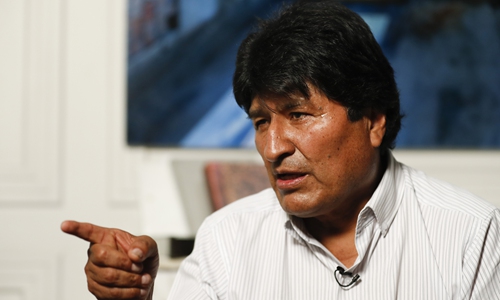HOME >> OPINION
Foreign specter on Latin America militaries
By María José Haro Sly Source:Global Times Published: 2019/11/28 19:43:40

Former Bolivian president Evo Morales Photo: IC
Exactly one year ago, reputed Professor of international relations Shi Yinhong gave a lecture on China-US relations at Renmin University of China's campus in Suzhou, East China's Jiangsu Province.For some reason, the lecture was also being attended by several military personnel from all over the world who were in China to participate in exchange programs. There were some military men from Latin America. Most Latin American people have this feeling of being part of a common identity no matter which country we come from. So, when we come across someone from the region, we always exchange words.
I struck a conversation with a Bolivian guy. He was not white, not indigenous, probably a "mestizo" mixed. I was curious about what he thought of young Bolivian military personnel in China. After over 10 years since Evo Morales assumed office as the president of Bolivia in 2006, I was expecting him to come out with his impression of a more progressive military, considering he was clearly neither white nor rich, as the major traditional elites in Bolivia are. But his answer was exactly the opposite, and I soon realized it was better not to go deeper into the talk and said a diplomatic goodbye.
After reaching home, I wrote to a good friend who was for years the minister of autonomies of Bolivia and the founder of an anti-imperialistic school for the armed forces, "I found one of your countrymen from a military exchange program in China. I was surprised with the degree of cipayism (the indigenous people who worked in the military to serve France, Portugal, and the UK to fight the Spanish empire) and his uncritical devotion for the US... I hope that the graduates of the anti-imperialist school have at least slightly transformed their world views!"
He answered, "Oh, don't tell me... Surely there are still many soldiers who long for the guidelines of the US. If they have a higher degree [of education], they are more pro-US. Petty officers and cadets are more oblivious to these imperial influences."
At that time, for most Latin American people, and for both of us, it was impossible to think of a coup d'etat in the 21st century, and less so in a stable country like Bolivia. The Southern American country was economically growing, fighting strongly against poverty, and uplifting indigenous people that were considered, since colonial times, second or third class citizens. Morales was the first indigenous leader in Bolivian history to make it to the presidency, which sounds surprising considering that 60 percent of the country's population is indigenous. After the coup on November 10, Morales and former vice president Álvaro García Linera went into exile in Mexico.
Recently, García Linera said that "for me, democracy isn't just elections - I'm talking about a deeper conception of democracy. Democracy is equality, the broadening of rights, the de-racialization of authority and the rights that people enjoy. For this reason, there can be no transformation process if it is not democratic," in an interview with Jacobin, a New York-based magazine, adding "What happened is that the traditional middle classes saw themselves as being 'invaded' by popular and indigenous layers who now had university education and savings, and now had greater capital of various kinds to take on public posts."
Right after the coup, the illegitimate "provisional government" of Jeanine Añez (a white congresswoman who comes from a party with less than 4 percent of the votes) and the cipayist armed forces came to power. It is worrying that they exonerated the armed forces of any crime committed in the "defense" of this process, enabling an uncontained repression by the military against the population.
The "due obedience" is against the law. This assault on the democratic process in Latin America by the military had been common in the 20th century. The support and training to the militaries by the US is well documented.
These assaults have been interrupting the development process of the region and adding more problems to the already complex situation. Most of the heads of the governments were defending foreign interest, leading to rising foreign debt, and attacking the national industry.
However, in the 21st century a repetition seemed a distant possibility. In the early 2000s, new forms of intervention were more common in the region as the political impeachments and the lawfare - the use of the legal system to act against the political opponent, combining the judicial system and the media directing public opinion for damaging or delegitimizing one's rivals.
Nevertheless, it seems that the recent release of former Brazilian president Luiz Inácio Lula da Silva from jail after a highly questionable judicial process, and after electing Alberto Fernandez and Cristina Kirchner as president and vice president in Argentina, this "soft-intervention" encountered some limits. Military repression against the people is increasing in some countries.
It seems that the region, once again, will need to pay attention to the military and their connection with foreign powers.
The author is an Argentine scholar at the Renmin University of China. opinion@globaltimes.com.cn
Posted in: VIEWPOINT